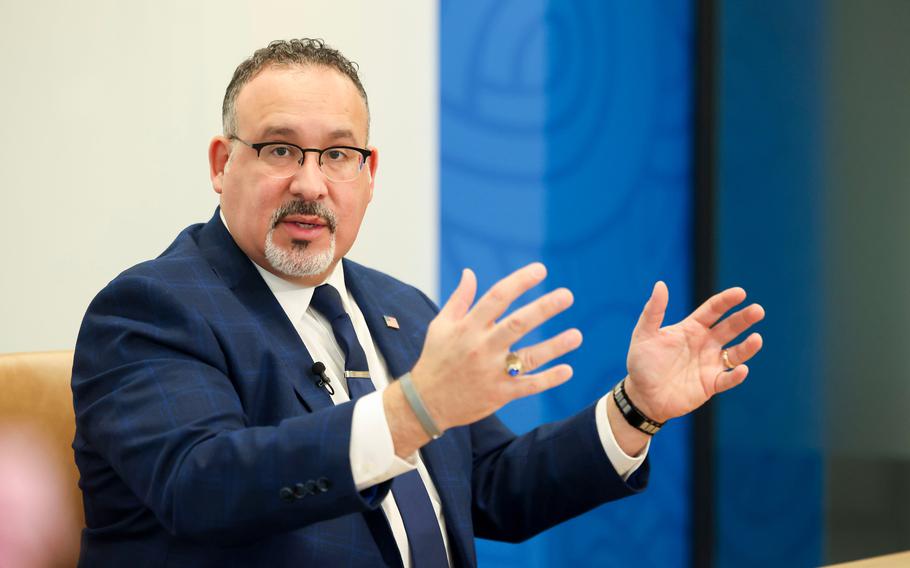
U.S. Secretary of Education Miguel Cardona meets Atlanta Journal-Constitution reporters and editors on Jan. 16, 2024, in Atlanta. (Jason Getz/The Atlanta Journal-Constitution/TNS)
(Tribune News Service) — The federal government has fumbled one of its largest obligations in education.
The result is chaos for colleges and millions of students who depend on the Free Application for Federal Student Aid (FAFSA) to access loans and scholarships.
The lack of accountability raises a deeper question: Why do federal bureaucrats have so much power over our education system? They clearly haven’t earned it.
As students return to classes and dorm rooms, the headlines keep rolling in about the widespread impact of the FAFSA fiasco. Due to confusion from the lack of completed federal forms, Minnesota left many students’ aid packages short by hundreds or thousands of dollars. In North Carolina, Queens College administrators announced budget cuts and layoffs after the “turbulent rollout” of FAFSA “wreaked havoc” on students’ college plans. A small liberal arts college in the Blue Ridge Mountains lost nearly a fourth of its incoming freshmen after students struggled to secure financial aid.
These stories are typical of the disruptions plaguing college applications and enrollment across the country.
As a mom of one college student and a high school senior, I experienced the confusion firsthand. After months of peppering parents with emails and blog posts teasing a more “user-friendly” experience, we ended up with a lot of confusion and wasted energy. Now the U.S. Department of Education is delaying the release of this year’s financial aid form an extra two months to buy more time to fix the mess.
College financial aid is the federal education agency’s biggest, most expensive job. But it isn’t the only one. The Education Department also doles out tens of billions of dollars each year to K-12 schools, mostly to help low-income students and students with special needs.
It’s past time for taxpayers and their elected representatives to ask whether the department has earned this responsibility — or whether we’d be better off if the federal bureaucrats got out of the way.
In both higher education and K-12, the department’s main job is to hand out taxpayer money. A growing number of Republicans have argued that if the agency largely serves as a conduit for taxpayer funding, why not cut out the middleman?
After all, the Education Department is one of the least-popular federal agencies. The Pew Research Center recently asked Americans to rate 16 agencies, and the Education Department was one of just three that received negative overall ratings — along with the scandal-plagued Justice Department and the often-maligned Internal Revenue Service.
The agency’s recent track record hasn’t done anything to turn perceptions around. Its bungling of college financial aid shows that independent aid organizations or financial institutions may be better suited to the job. And when it comes to K-12 programs, Congress can send the funding directly to states and school districts in the form of block grants.
The department’s defenders might object that over the years, polls have found voters don’t like the idea of eliminating it outright. But proposals to shrink the federal role in education could sound scary if pollsters don’t explain the details.
Without the Education Department, student loans would still be available, but they would be administered by efficient financial institutions with an incentive to make sure every borrower could find a good-paying job after finishing their degree. And funding could still flow to schools serving students from low-income families and children with special needs, but decisions about how to spend that money will be made by state and local leaders — people close to classrooms with a clearer view of what those students actually need.
These existing education programs might actually work better if we get ineffective Education Department bureaucrats out of the way.
Erika Donalds is CEO of OptimaEd and a Visiting Fellow in the Center for Education Policy at The Heritage Foundation.